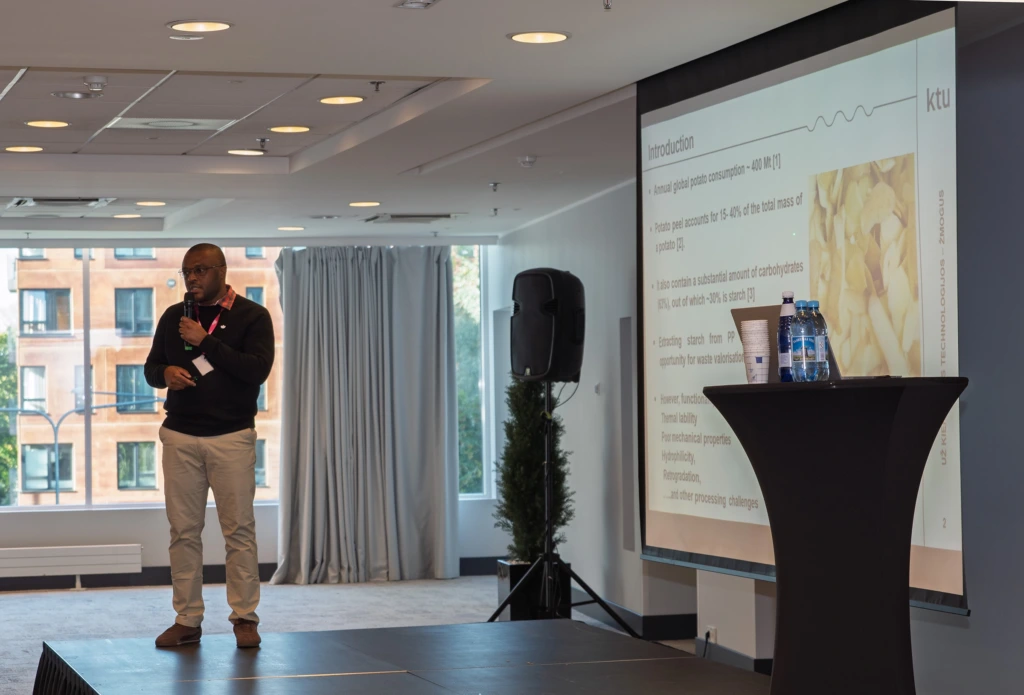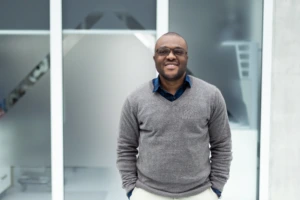When Ayodeji Emmanuel Tope Amobonye first learnt about Lithuania in his high school geography class in Nigeria, it seemed like a distant name on the map. Years later, that small Baltic country became the first place he calls home outside of Africa. “Lithuania is a small country in size but quite an efficient and big-hearted nation,” he says. What fascinated him most was the success story of the country – how it evolved into a very stable economy and democracy after regaining independence. “I hope to utilise some of these lessons in my home country someday,” he adds.
Now a postdoctoral researcher at Kaunas University of Technology (KTU), Dr Amobonye has spent more than a year in Lithuania and has come to appreciate how many values the two nations share. “Both Lithuanians and Nigerians are hardworking, resourceful, and resilient. We also share many cultural and social values – respect for elders, a sense of community, and warm hospitality,” says Amobonye. These similarities, he explains, made it easier to connect with people, even in a new cultural setting.
Finding belonging far from home
When Ayodeji Emmanuel Tope Amobonye first learnt about Lithuania in his high school geography class in Nigeria, it seemed like a distant name on the map. Years later, that small Baltic country became the first place he calls home outside of Africa. “Lithuania is a small country in size but quite an efficient and big-hearted nation,” he says. What fascinated him most was the success story of the country – how it evolved into a very stable economy and democracy after regaining independence. “I hope to utilise some of these lessons in my home country someday,” he adds.
Now a postdoctoral researcher at Kaunas University of Technology (KTU), Dr Amobonye has spent more than a year in Lithuania and has come to appreciate how many values the two nations share. “Both Lithuanians and Nigerians are hardworking, resourceful, and resilient. We also share many cultural and social values – respect for elders, a sense of community, and warm hospitality,” says Amobonye. These similarities, he explains, made it easier to connect with people, even in a new cultural setting.
Finding belonging far from home
Of course, there were cultural differences to adjust to. “Lithuanians tend to be reserved, calm, and straightforward in communication, while Nigerians are generally expressive and passionate in conversation,” he says. Still, he sees more similarities than differences between the two nations.
Even the Baltic climate, which he had been warned about before coming, turned out to be better than expected. “I had brought the thickest jackets while coming from South Africa, but I have not had much use for them,” Amobonye laughs.
After more than a year in Lithuania, Amobonye feels comfortable calling it home: “The weather is nice for me, the life is affordable, and the people are awesome. I will always be back to visit the new family that I have here”.
Becoming a better scientist in Lithuania
Amobonye’s fascination with science started early, when he studied at a science-focused high school in Nigeria and discovered his passion for laboratory work. “It was here that I knew that I wanted to be a lab rat, and that I would love to contribute my own quota to scientific knowledge,” says the scientist. After finishing school, Amobonye pursued a career in biochemistry, earning both his bachelor’s and master’s degrees in biochemistry, and later a PhD in biotechnology.
At KTU, Amobonye is working in the Polymer Research group, developing bioplastics that are bioactive and biodegradable from sustainable polysaccharides. “We are investigating the application of food industry or agricultural waste, for example, starch from potato peel and other sources for bioplastics development, and the use of antioxidant-rich extracts from nut shells as bioactive agents in the bioplastic to improve the functionalities,” he explains.
Amobonye says that the work goes beyond chemistry and materials – it’s about shaping how science contributes to a more sustainable future: “The general aims of all these projects are centred around valorisation and sustainability. I believe these works are important as the whole world is moving towards zero waste and responsible consumption”.
The interdisciplinary nature of his postdoctoral research has been particularly rewarding. Coming from a biological sciences background, Amobonye now works closely with chemists and material scientists, combining perspectives to create innovative results. “One of the aims of postdoctoral research is to be interdisciplinary – it is interesting to bring my perspective in bioactivity investigation and biodegradation into this project while learning relatively new skills like chemical synthesis and material characterisation,” explains KTU research fellow.
Reflecting on his time at KTU, Amobonye admits that the experience has changed him both personally and professionally: “I have learnt a lot from the Lithuanian cultures of modesty, work–life balance, as well as their respect for tradition and identity. Professionally, I can confidently say that I have become a better scientist than when I arrived here”.
He was recently named among the world’s Top 2 per cent most cited scientists, according to the latest global ranking – a recognition that he describes as both humbling and motivating.
The project Development of bioactive and biodegradable bioplastics from sustainable polysaccharides is funded by the Research Council of Lithuania (LMTLT), agreement No S-PD-24-33.




